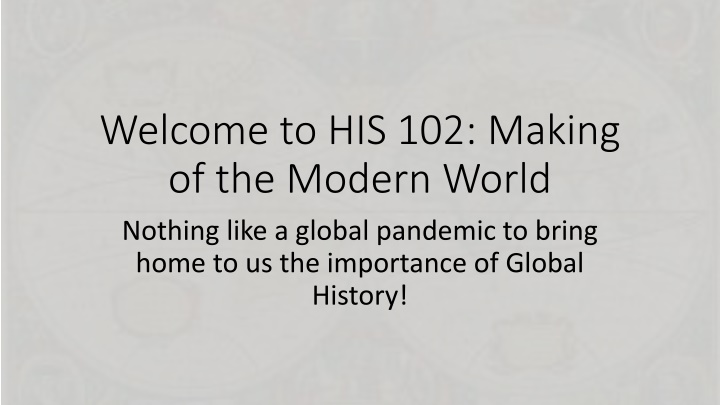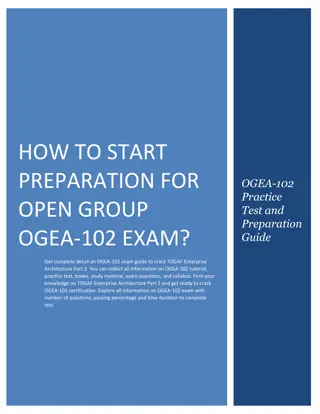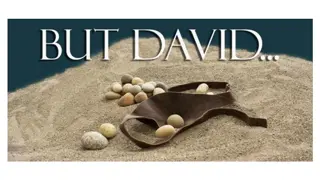Engaging Overview of HIS 102: Making of the Modern World
Welcome to HIS 102: Making of the Modern World course where the focus is on Global History's significance, with an emphasis on interconnectedness and how it shapes our world today. The course includes an introduction to the professor, GTAs, technology usage, syllabus details, assignments, and the pivotal role of Global History in understanding the complexities of our past and present.
Download Presentation

Please find below an Image/Link to download the presentation.
The content on the website is provided AS IS for your information and personal use only. It may not be sold, licensed, or shared on other websites without obtaining consent from the author.If you encounter any issues during the download, it is possible that the publisher has removed the file from their server.
You are allowed to download the files provided on this website for personal or commercial use, subject to the condition that they are used lawfully. All files are the property of their respective owners.
The content on the website is provided AS IS for your information and personal use only. It may not be sold, licensed, or shared on other websites without obtaining consent from the author.
E N D
Presentation Transcript
Welcome to HIS 102: Making of the Modern World Nothing like a global pandemic to bring home to us the importance of Global History!
Todays Agenda: Various Introductions Introduction to people running this course Your Professor: Sanjay Joshi Your Graduate Teaching Assistant: Ms. Audrey Casem Introduction to the Technology Blackboard or BbLearn THIS course page Introduction to the Syllabus Readings Assignments Teaching style and approach Most Important: An Introduction to Global History
Bb Learn Page Starting Page Contact Info (aka Office Hours) and communication (email) Protocols for communication Content Area : this is where I will be creating learning modules for the class. Looking at the information here is NOT A SUBSTITUTE, either for READING or for ATTENDING class sessions Assignments and Schedules Syllabus and Book My Grades (needs fixing!)
Syllabus Your GUIDE MAP to a complex, fast-moving course. This is probably your most important resource for the class. READ, carefully and often! Course Description and Summary; Course Objectives: give you an OVERVIEW. Come back to these when you feel lost (as you will!) Readings: One book (plus register for InQuizitive). Occasional extra readings or film. These are HYPERLINKED on COURSE SCHEDULE SCHEDULE: Think of it as close up of the guide map; what part of the course the module and the day covers; how to prepare for it; which assignments are opened up or are due that day Learning requires ACTIVE participation. I will not summarize assigned readings in class. I will add to them, help you see connections, relate what you read to bigger picture. To get the most out of class, come having completed assigned readings. InQuizitive a way to encourage you to do that
Objectives of this Course: Big Picture To demonstrate that we are all the products of a global, interconnected history That our ideas, our culture, our technology, our food, our music, our politics, our economics, our environment, and of course, our health are a product of a globally interconnected past that has, and continues to shape, our contemporary world Nothing like a global pandemic to bring home to us the importance of Global History! On a smaller scale, think of the device you are using, the clothes you are wearing, the music you listen to, your last meal (almost any part of your daily life), and if you think carefully, you will recognize them to be a product of this history of global connections not just where they come from (now), but HOW they came to be!
Global History as Challenge to National History Cannot be the sum of the histories of all parts of the world, that would be impossible. It actually *requires* us to rethink what we know as * history * At its simplest, Global History is two things (though both have broader implications) It shows the lasting impact of deep historical connections between people and places across time and space It is therefore a PERSPECTIVE, a way of understanding history, that necessarily challenges the idea of national history BECAUSE so much history has been the history of nations (we are the only academic discipline rooted to national boundaries) American/US history British history Nigerian history etc., global histories pose a particular challenge to our way of thinking about history in general Finally, global history challenges certain deeply held assumptions about the nature of humankind that have emerged only over the last 300 years or so, what we call Eurocentricism
Eurocentricism Eurocentricism, dictionary definition focusing on European culture or history to the exclusion of a wider view of the world; implicitly regarding European culture as preeminent. As a perspective Eurocentricism not only regards EuroAmerican culture as inherently superior and others as inferior (problematic enough) but has infused the very categories we use to understand the world, or even what is human thus LIMITING our understanding of history itself It pervades almost everything, maps e.g. Or pop. culture
Global History as a Challenge to Eurocentricism One of ways that the pervasiveness of Eurocentricism can be challenged is by what scholars call Provincializing Europe, demonstrating that ideas we take as universal were the products of a specifically Western history. How to do that? Global history in this course, starts ca. 1300; up to the 1700s, Europe or the West was small, insignificant, provincial, part of the world. So we study a world where these universal ideas were, indeed, provincial! Of course, this course goes on to look at how Western powers came to dominate the world after the mid-1700s but rather than a celebratory narrative, we look at the ways in which Western dominance came about through global connections rather than some inherent genius of Europeans and their migrant descendants A global perspectives allows us to better understand how genocide, slavery, and racism were as much a part of the Rise of the West as were scientific, technological or humanistic progress It allows us to see what we might otherwise term as barbaric, backward, or inhumane practices as part and parcel of all exploitative societies, whether western or non- western, rather than brushing over the problematic nature of some histories and highlighting the inhumanity only of the Others
Jeremy Adelmans Essay Professor Adelman (Princeton) is a widely respected scholar of global and Latin American history, and is the second author of our textbook Interesting argument, one that CAN be read as a celebration of, an obituary (requiem, perhaps), or even apologia for, global history But is best read as a warning about how difficult it is to challenge the deep- rooted national narratives of history, where being a cadre of flame-keepers of the national flame is often the task of historians Can also be read as a critique of the Eurocentricism of the turn to global history, which, given how little room was given to non-Western histories in history departments, was a pretty one-way exchanges about the shape of the global. The actual practice of global history, be suggests, became yet another Anglospheric invention to integrate the Other into a cosmopolitan narrative on our terms, in our tongues. Sort of like the wider world economy.
Global History: Possibility and Predicaments In the last zinger, Sort of like the wider world economy, Adelman references the very unequal terms in which a globalized economy has worked to the advantage of elites everywhere at the expense of working people Popular celebrations of globalization (a la Robert Friedman) and of global history overlooked the inequalities inherent in both Calls for greater attention to this histories of the subordinated, the ones left out, who have joined appeals to an equally elitist ultranationalist politics across the world The story of the globalists illuminates some at the expense of others, the left behind, the ones who cannot move, and those who become immobilised because the light no longer shines on them. we need narratives of global life that reckon with disintegration as well as integration, the costs and not just the bounty of interdependence. They might not do well on the chirpy TED-talk circuit .... But if we are going to come to terms with the deep histories of global transformations, we need to remind ourselves of one of the historian s crafts, and listen to the other half of the globe, the tribalists out there and right here, talking back.






















